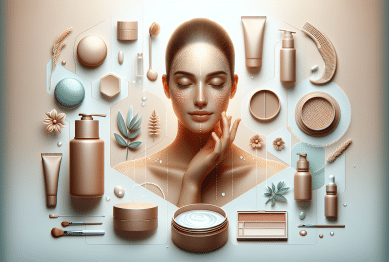Curious about collagen and the claims behind youthful skin? This guide explores how collagen may support skin elasticity, hydration, and overall wellness. Dive deeper into how it interacts with your body, common forms you’ll see on beauty shelves, and the science-backed facts everyone asks about collagen.
Curious About Collagen? Start Here
Collagen has become a popular term across beauty spaces, but what does it truly mean for wellness and skin health? Collagen is the main protein making up structure in skin, bones, and connective tissue. Interest in collagen for skin has soared as more seek ways to support elasticity, hydration, and that youthful look. Collagen helps give your skin its plump, springy texture—something that naturally changes over time.
Some people try supplements or creams, hoping to improve the appearance of fine lines and wrinkles. With so many forms, from hydrolyzed powders to topical serums, it’s important to distinguish what each option actually offers. Collagen molecules are naturally present in the body, but as the years pass, we produce less of it—which can contribute to visible skin aging. This shift drives curiosity about adding collagen from outside sources, whether through nutrition or skincare routines.
A basic understanding of collagen’s role in skin structure helps make sense of industry buzzwords like peptides, amino acids, and dermal support. Many turn to collagen for its perceived connection to improved skin barrier, enhanced moisture, and smoother texture. Before exploring whether it has tangible effects, looking at real research and expert opinions provides a grounded approach to wellness-oriented beauty.
How Your Body Uses Collagen
Collagen is created naturally through a mix of dietary nutrients and internal processes. Amino acids, especially from protein-rich foods, are essential building blocks for collagen formation. Vitamin C is also vital, supporting the formation of stable collagen fibers. Some experts recommend a balanced diet with vitamin C, proline, glycine, and copper to best support the body’s natural collagen production (https://www.hsph.harvard.edu/nutritionsource/collagen/).
Collagen types are not all the same. Type I predominates in skin, while other types play roles in cartilage or tissue repair. Your body is efficient—when collagen is consumed, it is often broken down to amino acids, which are then used where needed. The visible results, such as skin elasticity, depend not just on intake but also on overall wellness, lifestyle, and skincare habits. Regular habits like balanced eating and sun protection have a major impact alongside any beauty regimen.
Many people wonder if collagen supplements go directly to the skin. Research shows these supplements break down in the gut into smaller peptides or amino acids. Some animal and human studies suggest these byproducts may help signal more collagen production in the skin layers, but results are gradual and differ for everyone (https://ods.od.nih.gov/factsheets/Collagen-Consumer/). The science in this space is developing, but the interplay between nutrition and skin health is clear.
Exploring Collagen By The Numbers
Scientific studies that explore collagen’s impact on the skin can sometimes seem technical. In clinical settings, oral collagen peptide intake for around 8 to 12 weeks has been associated in some research with improved skin hydration, reduced wrinkle depth, and better elasticity compared to a placebo (https://www.ncbi.nlm.nih.gov/pmc/articles/PMC6835901/). However, study results and design can vary considerably, so broader reviews are needed for firm conclusions.
Most experts agree that collagen supplementation appears safe for healthy adults, with no widespread adverse effects reported in controlled studies. It’s important to know that the U.S. FDA classifies these supplements as a food, not a drug, so regulation is different than with pharmaceuticals. Choosing reputable brands and checking ingredient lists is always wise if you wish to explore these options (https://www.fda.gov/food/dietary-supplements).
The benefits people discuss—like firmer skin or a dewier appearance—might be subtle and develop slowly. Some studies use visual assessments, while others use technical skin measurements. Results often depend on age, genetics, lifestyle, and adherence to broader wellness routines. Science continues to examine who might experience noticeable improvements and under what circumstances, reinforcing the role that lifestyle and nutrition play in the larger wellness picture.
Topical Collagen: Hype Versus Reality
Another area that invites curiosity is topical collagen in creams and serums. These products tout benefits like enhanced hydration and plumper texture, but scientific consensus is that collagen molecules themselves are usually too large to penetrate deeper skin layers. Instead, such products may help by boosting surface moisture and giving a temporarily smoother appearance (https://www.aad.org/public/everyday-care/skin-care-basics/care/collagen).
Peptides derived from collagen and smaller fragments are more likely to reach deeper layers, potentially signaling skin cells to increase collagen synthesis. Look for ingredients like hydrolyzed collagen or tripeptides—many of which feature in modern cosmeceuticals. While these don’t replace a healthy lifestyle, they may complement hydration routines when paired with broad-spectrum sunscreen and antioxidants.
Consumers often wonder if topical collagen is a substitute for procedures or internal supplements. Experts highlight these can temporarily improve the feel and look of the skin but are unlikely to affect the deeper dermal structure alone. The best approach combines thoughtful skincare, sun protection, and balanced nutrition for the broadest range of skin wellness benefits, rather than depending solely on external creams.
Collagen and Lifestyle Choices: What Impacts Results?
While adding collagen to your wellness regimen can be interesting, everyday choices play a significant role in how skin ages and maintains vitality. Regular sun exposure, smoking, and chronic stress are widely known to speed up collagen breakdown, impacting firmness and smoothness (https://www.cdc.gov/skin-cancer/prevention/). Wearing protective clothing and daily sunscreen help to slow this process naturally.
Hydration, balanced diet, and consistent sleep also support skin health in visible ways. Foods rich in antioxidants, such as berries, leafy greens, and nuts, offer protective benefits against environmental stressors. Moderate exercise may help circulation, delivering nutrients to skin and supporting natural repair processes. Together, these habits lay the groundwork for skin that looks and feels its healthiest—regardless of supplements.
Some individuals track improvements in skin tone, tightness, or comfort as they adjust routines, but patience is essential—science shows that visible changes usually occur gradually. Tracking progress through photos or skin hydration tests can help in observing subtle shifts. Integrating a range of healthy habits creates an environment where skin has the support it needs, maximizing the potential benefit from any collagen-related routines.
Debunking Common Collagen Myths
Among the flood of marketing claims, it’s easy to run into myths about collagen. Some sources suggest collagen can erase years overnight, but expert-backed research indicates a gentler, cumulative result when embedded in a holistic wellness routine. Collagen may assist in maintaining skin elasticity or hydration, but no single supplement is a miracle fix (https://www.mountsinai.org/health-library/supplement/collagen).
Other myths include one-size-fits-all dosing or the idea that collagen only works for skin. In reality, the body uses collagen in many areas, like ligaments and cartilage, so supplementation can have different priorities depending on individual needs. Personalized approaches, guided by a healthcare provider or nutritionist, offer more tailored and realistic expectations.
Fear of dietary collagen causing allergies or imbalances is also widespread. Most people tolerate hydrolyzed collagen supplements well, but checking the source—such as bovine, marine, or chicken—and allergen content is always smart. Responsible use and open conversations with a health professional help navigate the world of collagen intelligently and safely, ensuring any new addition is supportive and thoughtful.
References
1. Harvard T.H. Chan School of Public Health. (n.d.). Collagen. Retrieved from https://www.hsph.harvard.edu/nutritionsource/collagen/
2. National Institutes of Health Office of Dietary Supplements. (n.d.). Collagen. Retrieved from https://ods.od.nih.gov/factsheets/Collagen-Consumer/
3. Hexsel, D., Zague, V., Schunck, M., Siega, C., & Filho, J. (2017). Oral supplementation with specific bioactive collagen peptides improves nail growth and reduces symptoms of brittle nails. Dermatology Practical & Conceptual, 7(3), 9-17. Retrieved from https://www.ncbi.nlm.nih.gov/pmc/articles/PMC6835901/
4. U.S. Food & Drug Administration. (n.d.). Dietary Supplements. Retrieved from https://www.fda.gov/food/dietary-supplements
5. American Academy of Dermatology Association. (n.d.). Collagen: What it is and why it matters for your skin. Retrieved from https://www.aad.org/public/everyday-care/skin-care-basics/care/collagen
6. Mount Sinai. (n.d.). Collagen. Retrieved from https://www.mountsinai.org/health-library/supplement/collagen










 Brain Reset Secrets Scientists Want You to Try
Brain Reset Secrets Scientists Want You to Try 

